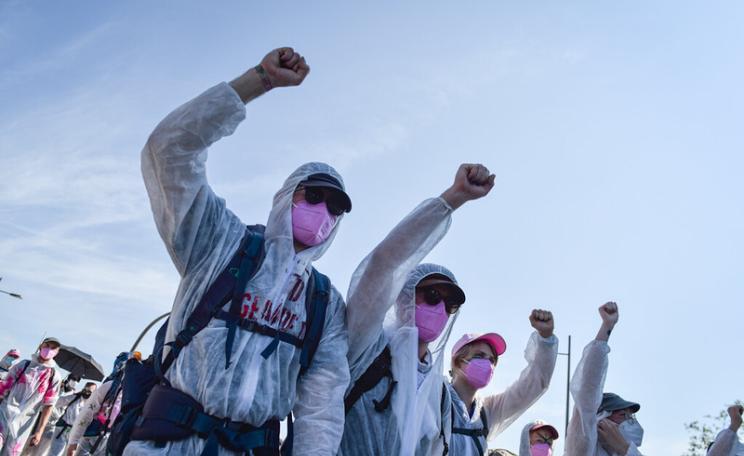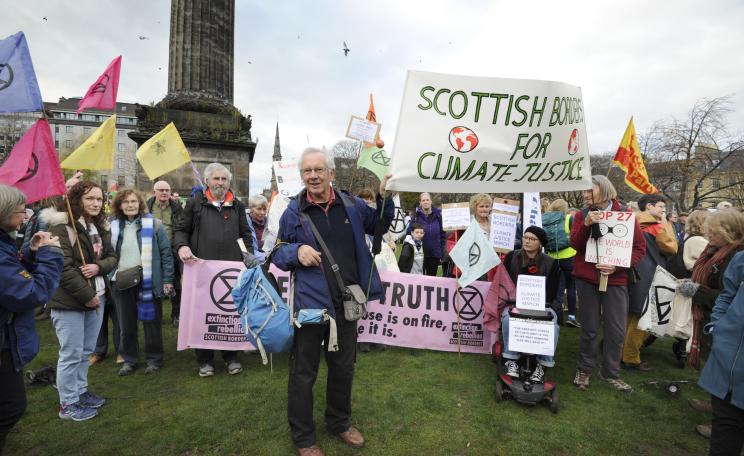The move to blue hydrogen is just one of the oil industry’s many efforts to greenwash its way into continued production.
Direct action group Climate Camp Scotland has announced that its fourth camp and concomitant disruptive action will take place in Europe’s oil capital, Aberdeen, from Wednesday, 10 July 2024.
The organisers agreed on the location for a wide range of reasons. These include a desire to deepen relationships with local groups, to defend a community greenspace, to confront and disrupt the blatant greenwash of the industry’s pivot to blue hydrogen, and to challenge the broader wave of fossil fuel development typified by the Rosebank go-ahead.
The decision, taken during an all-day meeting in Glasgow in January marks an important moment for the young movement’s growth.
Deliberation
First pitching their tents in 2021, the group has come to the forefront of the Scottish climate movement with an innovative combination of bold tactics and astute politics. Organisers hope to continue their steady growth, while also striking delicate strategic and narrative balances – not least after the recent shock-closure of Grangemouth refinery. This will be the movement’s second visit to the granite city – its last, in 2022, saw the occupation of a major port.
The Glasgow meeting centred on the question of location. By this point, organisers had narrowed their options down to either Mossmorran (site of a petrochemical plant causing profound damage to the community, and another previous location for the camp) and Aberdeen.
The discussion was informed by input from a research-group, activists’ own experience with these locations and communities, and above all input from representatives of the communities themselves.
Mossmorran was seriously considered on the grounds of its relatively clear-cut ethical stakes (multiple reports have found significant effects on residents’ health and wellbeing), track-record of community resistance, the ease of achieving well-targeted disruption, its relative accessibility, and MSPs’ bid for an urgent summit on the plant’s future.
But the meeting ultimately found Aberdeen to be the better choice. A major motivation was the possibility of assisting the Save St Fittick’s Park campaign. Despite previous support from CCS, the local group has so far failed to prevent plans to destroy a valued community resource and convert it into a blue hydrogen plant, as part of the oil industry’s Energy Transition Zone (ETZ).
Whether or not CCS elects to occupy the park itself, the ETZ will likely serve as a bridge between local and global issues. The move to blue hydrogen is just one of the oil industry’s many efforts to greenwash its way into continued production. And this production is certainly continuing: organisers were quick to note Aberdeen’s central role in Rishi Sunak’s bid to “max out” oil and gas production (in defiance of the International Energy Agency’s 2021 warning against any new developments).
Impacts
Though the meeting agreed on Aberdeen as a general location, it did not specify a target for actions – a dedicated team has now been tasked with exploring this question.
The move to blue hydrogen is just one of the oil industry’s many efforts to greenwash its way into continued production.
We do, however, know some things for certain already. The group’s strategy is mass-participation nonviolent direct action against the oil and gas industry (and in favour of a just transition). In 2022, CCS carried out an occupation of the Port of Aberdeen – Scotland’s largest berthage port. In 2023 they disrupted Grangemouth oil refinery, with one group even reaching a power station roof.
Aberdeen is among the country’s richest locations for such actions. Infrastructural targets under consideration include storage, pipelines, airports, heliports, regular ports, varied greenwashing projects, political institutions, and the “climate disaster” of a possible new gas station at Peterhead. The biggest name in town is Shell, but potential partners in infamy include Equinor and Ithaca – both big players in the controversial Rosebank development.
And while Sunday’s meeting re-asserted a preference to avoid “theatrical” disruption of offices, these remain under consideration for their potential to connect local realities with global injustices. The city’s Lloyds bank, for example, could serve to illustrate the intersection of local injustices with the global neocolonialism represented by Lloyds’ insurance of EACOP. Such connections could be especially resonant in what will likely be the run-up to a UK general election.
At the same time, CCS is notable among climate groups for its focus on empowering local communities. Despite the city’s historic reliance on oil, many residents are already pushing for a cleaner, fairer future: initiatives include the Friends of St Fittick’s Park, the Aberdeen Social Centre, an active climate youth scene, and local chapters of Extinction Rebellion and Friends of the Earth.
Balance
The event in Glasgow may have centred on strategic contemplation, but it also featured a significant “advanced direct action” training. Among other content which organisers asked me not to specify, there was a recapitulation of CCS’s philosophy of direct action. This is that such action must be targeted, disruptive, nonviolent, and that it must empower those taking part.
This last element reflects the group’s more introspective tendencies, and its self-consciousness as a young and evolving movement. Members expressed the hope that Aberdeen would allow the camp to continue growing from last year’s numbers of roughly 200. This growth is hoped to derive both from ‘outlander’ attendance and local appeal.
The question of local outreach has been an increasingly dominant theme in the group’s thinking. While extending solidarity to those in fossil capital’s ‘sacrifice zones’ might seem straightforward, it’s more complicated when it comes to those working directly in the oil and gas industry. This complexity was recently underlined by the sudden closure of Grangemouth oil refinery – the site of last year’s camp.
CCS was prompt in responding that this closure was neither “just” (it leaves workers high and dry) nor a “transition” (the plant will keep on running, just with outsourced inputs). CCS members at Sunday’s talks were keen to develop their role as working with and not against oil workers, in the hope of a truly just transition to a renewables-led energy sector.
Connection
Jim, an organiser involved in community outreach, says: “We want to work with the people of Aberdeen to stop a bad situation getting worse. Poverty and food insecurity are serious problems and getting more so. It's clear the fossil fuel industry isn't working for this community – we need to move away from it to something which is less harmful to people and planet”.
Alongside all the high-concept pondering, Sunday’s meeting also saw renewed commitment to the Camp as a work of movement-building. As exemplified by ally-group This is Rigged (numerous members of which were present for the CCS event), movements are only as strong as their interconnections.
Last year’s camp saw a strong focus on inclusion and accessibility, and beyond the action itself there was a plethora of talks, trainings, workshops and performances, bringing together an impressive range of nationalities and traditions.
The strategy and tactics of direct action are no doubt important; but maybe the real climate camp will be the friends we make along the way.
This Author
Douglas Rogers is a writer, activist, and editor of Raveller magazine. Climate Camp Scotland is taking place from 10-15 July in Aberdeen.





